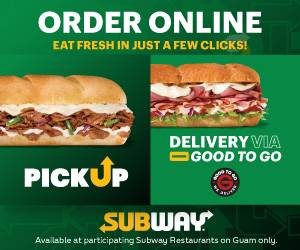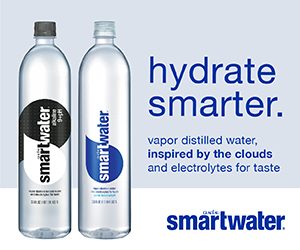By Rianne Peredo
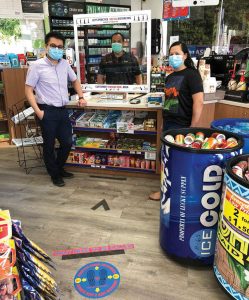
(From left) Jimmy Tim Chau Hau, president; Sergio Alves, area manager; and Jennifer Duenas, territory manager, all of Mobil Oil Guam Inc., show the safety measures instated by the company at the east Hagåtña Mobil service station on April 8.
Photo courtesy of Mobil Oil Guam
As the global COVID-19 situation affects multiple businesses in a variety of industries, the petroleum industry is one that has adapted to the associated challenges.
How many employees are there within the company?
- Brian Bamba, managing director of Isla Petroleum & Energy Holdings LLC: “More than 300 across the Micronesia region.”
- Jimmy Tim Chau Hau, president of Mobil Oil Guam Inc.: “Approximately 300.”
- Douglas Dean, senior vice president and general manager of South Pacific Petroleum Corp.: “Approximately 180.”
- Kazhakuttam Kunjuramn “K.K.” Vikraman, general manager of Tristar Terminals Guam Inc., a subsidy of Agility Defense & Government Services: “32.”
- George Chiu, president of Blue Bay Petroleum Guam: “5.”
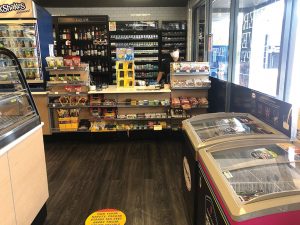
Agnes Tio, customer service cashier, stands at the register at the Mangilao Shell service station on April 16.
How are businesses and consumers reacting to gas consumption and convenience store products?
- Hau: “It’s an unprecedented situation; we saw it affecting the tourism industry early on affecting Guam and Saipan. It resulted in an aviation sales fuel drop and tourism itself led to economic slow-down. Demand for fuels dropped accordingly. With policies and zero tourists, it affected aviation fuels, and at service station level, the demand. There is an initial demand, so we will continue to keep our service stations operating as best as we can for the needs of the community.”
- Bamba: “Fuel demand tends to spike during a natural disaster like a storm or typhoon. People prepare, whether for power, post recovery activities, or mobility. Similarly, at the onset of the COVID-19 situation, people were taking those same precautions. However, unlike a storm, the duration is uncertain, which lends to more challenges. Shortly after stay in place quarantine measures were directed, we saw the effect of fewer people moving around. While it impacts our business in the short term, we recognize it’s the best way to control the situation. The reasons people choose Foody’s for convenience items remains. We did have to make changes as directives were issued by the governor; those were meant to ensure the safety of our employees and customers.”
- Dean: “Gas consumption appears to be considerably down during the lockdown. The volume in convenience stores is down, but not as much as fuel is.”
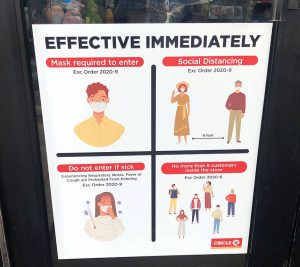
A sign is posted at the Barrigada 76 Circle K service station in compliance with the government’s executive order.
Are businesses being reactive or proactive in the market to the COVID-19 challenges?
- Hau: “Businesses are being generally proactive. We see a lot of behavioral change in regard to social distancing and wearing surgical masks, washing hands more frequently.”
- Bamba: “This is unchartered territory for all of us, and the COVID challenges are similar all over the world. We are fortunate that we could learn from other countries’ handling of the situation. However, what you do with that information and the timing of decisions could always be improved. This is one of those times that we benefit from being isolated, which hopefully allows us to contain and control easier than countries with contiguous borders like Europe or North America. I’d say given the uncertainty, most businesses are looking to do their part to flatten the curve.”
- Dean: “We can’t step in front of the government; we have to react to whatever the government tells us to do. Our business and some others — for example, the restaurants — are trying to find proactive solutions to the situation which we are forced to follow. We are being both. We have made some endeavors to keep serving customers in a proactive manner while responding to the government’s directions.”
- Chiu: “We’re obviously distribution of gasoline and lubricants; we are considered as an essential business — to stay in business you have to be proactive. We provide them with all the necessary PPE to stay out there. Prior to the mandated usage of PPE in the workplace, we had already been implementing those; limiting face to face interaction and social interaction in the workplace.”
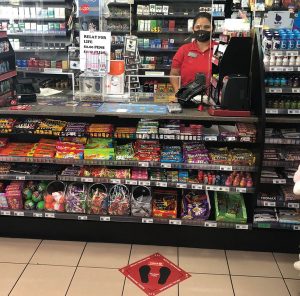
Assuncion Clare Penalosa, customer service representative, stands behind a protective glass pane at the Barrigada 76 Circle K service station on April 16.
Have you introduced any measures within the company to handle the COVID-19 challenges?
- Hau: “For our own employees, we have working from home depending on the job nature where possible, we encourage them to work from home. For staff at the terminals and service stations, where it’s not possible, we emphasize social distancing and wearing of masks. At the terminals, we take temperatures of employees twice a day; if employees are not well, we encourage them to not come to work. We have specially designed clear window panels for our cashiers and for our customers and supplied surgical masks to our employees. We have also increased the frequency of our cleanings on high-touch surfaces. We encourage our customers to do social distancing when lining up. At the moment, we are trying to promote our pay at the pump service.”
- Bamba: “We took precautionary measures in our offices to allow for telecommuting, working remotely and preventing unnecessary gatherings. We equipped front line staff with personal protective equipment to keep them safe at work. In line with government directives and our own best practices, we improved operating procedures to reduce risks at all points of operations — increased frequency of disinfecting and cleaning at terminals and retail sites, adhering to CDC guidelines for social distancing, etc.”
- Dean: “We are increasing our level of cleaning to respond to the incident as well as doing some special things. We placed protective screens in our business for the cashiers to make everyone more comfortable. We are putting marks down for social distancing. We are actively trying to make our customers and staff feel safe in this virus situation.”
- Vikraman: “We have limited staff operating at the business, some are working from home. Only a few staff is required for maintenance. We have a housekeeping contract, with staff working that field with hand sanitizers and personal protective equipment.”
- Chiu: “The measures we introduced are safety guidelines — we have a daily temperature check whenever you enter the office. If your temp. exceeds the recommended 99 degrees Fahrenheit, you are not allowed in the office and told to stay home and self quarantine. At work, they are wearing face masks and we provide them with hand sanitizers upon entry to the facility and recommend they wash hands on the regular basis and wear their masks at all times. We keep the door locked and screen them. As a distribution business, we don’t have too much face to face interaction with customers; it’s basically deliveries.”











